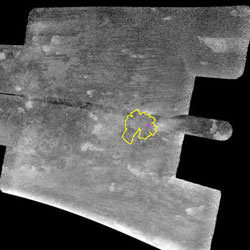The area marked in yellow is the region imaged by Huygens as it landed. Image credit: NASA/JPL/SSI.
Click to enlarge
. The Cassini spacecraft carried the European Space Agency's Huygens probe to Saturn and released it in December 2004. The probe landed on Titan Jan. 14, 2005, acquiring a set of images using the descent imager/spectral radiometer camera as it parachuted to the surface.
As Cassini continued to orbit Saturn, its imaging science subsystem and visual and infrared mapping spectrometer mapped the region where the Huygens probe landed. On Friday, Oct. 28, 2005, Cassini's radar instrument provided the highest resolution orbital data yet of this area.
The two images shown here tell the story. On the left, in color, is a composite of the imaging camera and infrared data (red areas are brighter and blue darker, as seen in infrared). On the right is the synthetic aperture radar image. The Huygens descent images are shown inset on the left image and outlined in yellow on the right. The magenta cross in both images shows the best estimate of the actual Huygens landing site. This is a preliminary result, based on the best information available at the present time.
In the left image, the brighter areas seen by the Huygens camera correspond to the large area depicted in red and yellow. On closer inspection, bright features within the Huygens mosaic seem to correspond to smaller features in the map composed of data from the visual and infrared spectrometer and imaging camera. On the right, the correspondence is less clear. In radar images bright features are usually rougher, so one would not necessarily expect an obvious connection.
The Cassini-Huygens mission is a cooperative project of NASA, the European Space Agency and the Italian Space Agency. The Jet Propulsion Laboratory, a division of the California Institute of Technology in Pasadena, manages the mission for NASA's Science Mission Directorate, Washington, D.C. The Cassini orbiter was designed, developed and assembled at JPL. The radar instrument team is based at JPL, working with team members from the United States and several European countries. The visual and infrared mapping spectrometer team is based at the University of Arizona. The imaging operations center is based at the Space Science Institute in Boulder, Colo.
For more information about the Cassini-Huygens mission visit
http://saturn.jpl.nasa.gov
.
NASA/JPL/SSI News Release
 Universe Today
Universe Today
